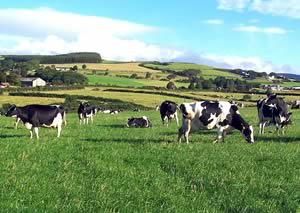|
30/10/06
Isle of Man dairy farmer Paul Fargher has made it through to
the final of the fiercely contested competition run annually
by the British Grassland Society, and sponsored by DLF Trifolium
and Kemira GrowHow.
Paul’s cows out enjoying some late summer grazing.
 |
The National Grassland Management Competition sets out to find
the farmer who best demonstrates excellence in the management of
grass and forage, leading to profitable livestock production and
care of the land.
Paul is a first generation farmer who has built up an impressive
dairy business from very little, over the past 18 years. By working
hard and setting and achieving physical and financial targets,
he has transformed a run-down beef farm in the wet and windy east
of the island, into a highly successful dairy unit.
Paul took on the tenancy of Baldromma Farm in 1999 which runs to
91ha (232 acres). He built a new dairy for 130 cows and doubled
the original herd from 70 – buying in replacements to speed
up the process. The cows now yield 9,550 litres a year, calve all
year round and are fed grass and wholecrop silage all year, with
concentrates offered in out-of-parlour feeders.
Crops are grown in an eight year rotation- two years spring wheat
then one year spring barley, under sown with a grass and clover
ley, which stays down for five years. This constant re-seeding
allows the latest varieties to be introduced which means the overall
quality of the grass is very high. Stubbles from the wholecrop
cereals are sometimes drilled with stubble turnips to provide material
for grazing dry cows and youngstock in the autumn.
Farm manures are regarded as an asset rather than a problem, and
the sandy/stony soils allow spreading throughout the year. All
fields are soil tested regularly and the results used to formulate
farm fertiliser policy.
“Paul farms in a very business-like manner,” comments
SAC’s Dr Dave Roberts, who is chairing the competition judging
panel. “While gross margins per cow and per hectare are very
important, he is acutely aware that it is the management of fixed
costs which ultimately drive the profitability of his business.
He has set Baldromma up so that it can be farmed almost single
handedly. The use of contractors and part time staff keeps labour
and machinery costs to a bare minimum.”
Paul is also keen on improving the natural features and wildlife
habitats on the farm. Inaccessible areas totalling 1.2ha (3acres)
have been planted with mixed deciduous trees, and 1.5 miles of
fence lines beside waterways have been moved to allow natural regeneration
of habitats.
“Paul, like the other two national finalists, is not only
an excellent grassland manager, but is also very good at growing
and utilising a range of other forage crops that fit well into
the overall farming system,” says Dr Roberts. “It has
been a pleasure to visit his farm, and he certainly deserves his
place in the final of this year’s competition.”
The Final
The climax of the competition comes on 9 November when the three
finalists come together in Gloucestershire to make a short presentation
about their farms to the judges. The winner will then be announced
and awarded the coveted Kemira Trophy and a cheque for £500.
 Booths land Craven Dairy Auction
double Booths land Craven Dairy Auction
double
 Funding
Helps Finance Vet and Farmer Team Training Funding
Helps Finance Vet and Farmer Team Training
 Campaign
for a Sustainable Dairy Industry Gathers Pace Campaign
for a Sustainable Dairy Industry Gathers Pace
|



